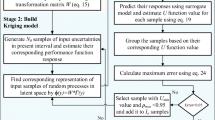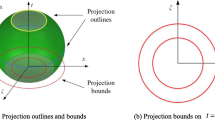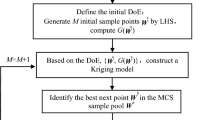Abstract
Due to dynamic uncertainties presence in service and performance conditions, time-dependent reliability prediction of a component or structure is a challenging problem. In this research, a transfer learning-based technique is proposed to predict the reliability in the future. The complete time interval is divided into two sub-intervals namely, present interval and future interval. It is assumed that the performance function information is available for the present interval only. Transfer learning, specifically domain adaptation is used to transform the stochastic processes to be represented in a way that their sample spaces in different time durations are made closer while maintaining some of their statistical properties such as variance. In order to transform the stochastic processes, correlated samples of stochastic processes are generated using a space-filling sampling technique for the complete time interval. An adaptive Kriging surrogate model is then built using the performance information available for the present interval only using transformed stochastic process samples. The built Kriging model is employed to estimate and predict the reliability for present and future intervals without retraining it using future data. Results show that the proposed method can predict the failure probability in present and future intervals accurately with significant efficiency improvement.









Similar content being viewed by others
References
Andrieu-Renaud C, Sudret B, Lemaire M (2004) The PHI2 method: a way to compute time-variant reliability. Reliab Eng Syst Saf 84:75–86
Bataleblu AA (2019) Computational intelligence and its applications in uncertainty-based design optimization. Bridge Optimization-Inspection and Condition Monitoring. IntechOpen, In
Dellino G, Meloni C (2015) Uncertainty management in simulation-optimization of complex systems. Springer
Du X (2014) Time-dependent mechanism reliability analysis with envelope functions and first-order approximation. J Mech Des 136:81010
Dubourg V, Sudret B, Bourinet J-M (2011) Reliability-based design optimization using kriging surrogates and subset simulation. Struct Multidiscip Optim 44:673–690
Echard B, Gayton N, Lemaire M (2011) AK-MCS: an active learning reliability method combining Kriging and Monte Carlo simulation. Struct Saf 33:145–154
Gretton A, Bousquet O, Smola A, Schölkopf B (2005) Measuring statistical dependence with Hilbert-Schmidt norms. International conference on algorithmic learning theory. Springer, In, pp 63–77
Hu Z, Du X (2013a) Time-dependent reliability analysis with joint upcrossing rates. Struct Multidiscip Optim 48:893–907
Hu Z, Du X (2013b) A sampling approach to extreme value distribution for time-dependent reliability analysis. J Mech Des 135:071003
Hu Z, Du X (2015) Mixed efficient global optimization for time-dependent reliability analysis. J Mech Des 137:051401
Hu Z, Mahadevan S (2016) A single-loop kriging surrogate modeling for time-dependent reliability analysis. J Mech Des 138:61406
Jiang M, Huang Z, Qiu L et al (2017) Transfer learning-based dynamic multiobjective optimization algorithms. IEEE Trans Evol Comput 22:501–514
Jones DR, Schonlau M, Welch WJ (1998) Efficient global optimization of expensive black-box functions. J Glob Optim 13:455–492
Li C-C, Der Kiureghian A (1993) Optimal discretization of random fields. J Eng Mech 119:1136–1154
Lophaven SN, Nielsen HB, Søndergaard J (2002) DACE: a Matlab kriging toolbox. Citeseer
Lu J, Behbood V, Hao P et al (2015) Transfer learning using computational intelligence: a survey. Knowledge-Based Syst 80:14–23
Lutes LD, Sarkani S (2004) Random vibrations: analysis of structural and mechanical systems. Butterworth-Heinemann
Matasci G, Volpi M, Kanevski M et al (2015) Semisupervised transfer component analysis for domain adaptation in remote sensing image classification. IEEE Trans Geosci Remote Sens 53:3550–3564
Min ATW, Sagarna R, Gupta A et al (2017) Knowledge transfer through machine learning in aircraft design. IEEE Comput Intell Mag 12:48–60
Pan SJ, Yang Q (2009) A survey on transfer learning. IEEE Trans Knowl Data Eng 22:1345–1359
Pan SJ, Tsang IW, Kwok JT, Yang Q (2010) Domain adaptation via transfer component analysis. IEEE Trans Neural Netw 22:199–210
Rasmussen CE (2003) Gaussian processes in machine learning. Summer School on Machine Learning. Springer, In, pp 63–71
Rice SO (1945) Mathematical analysis of random noise. Bell Syst Tech J 24:46–156
Roshanian J, Bataleblu AA, Ebrahimi M (2018) A novel evolution control strategy for surrogate-assisted design optimization. Struct Multidiscip Optim 58:1255–1273
Roshanian J, Bataleblu AA, Ebrahimi M (2020) A novel metamodel management strategy for robust trajectory design of an expendable launch vehicle. Proc Inst Mech Eng Part G J Aerosp Eng 234:236–253
Schneider R, Thöns S, Straub D (2017) Reliability analysis and updating of deteriorating systems with subset simulation. Struct Saf 64:20–36
Shawe-Taylor J, Cristianini N (2004) Kernel methods for pattern analysis. Cambridge University Press
Shi Y, Lu Z, Xu L, Chen S (2019) An adaptive multiple-Kriging-surrogate method for time-dependent reliability analysis. Appl Math Model 70:545–571
Singh A, Mourelatos ZP (2010) On the time-dependent reliability of non-monotonic, non-repairable systems. SAE Int J Mater Manuf 3:425–444
Stein M (1987) Large sample properties of simulations using Latin hypercube sampling. Technometrics 29:143–151
Sun H (2005) Mercer theorem for RKHS on noncompact sets. J Complex 21:337–349
Tenne Y, Goh C-K (2010) Computational intelligence in expensive optimization problems. Springer Science & Business Media
Vennell R (2011) Estimating the power potential of tidal currents and the impact of power extraction on flow speeds. Renew Energy 36:3558–3565
Wang Z, Chen W (2017) Confidence-based adaptive extreme response surface for time-variant reliability analysis under random excitation. Struct Saf 64:76–86
Wang Z, Wang P (2015) A double-loop adaptive sampling approach for sensitivity-free dynamic reliability analysis. Reliab Eng Syst Saf 142:346–356
Wang Z, Mourelatos ZP, Li J et al (2014) Time-dependent reliability of dynamic systems using subset simulation with splitting over a series of correlated time intervals. J Mech Des 136:061008
Wang Z, Cheng X, Liu J (2018) Time-dependent concurrent reliability-based design optimization integrating experiment-based model validation. Struct Multidiscip Optim 57:1523–1531
Wang Z, Liu J, Yu S (2019) Time-variant reliability prediction for dynamic systems using partial information. Reliab Eng Syst Saf 106756
Yan K, Kou L, Zhang D (2017) Learning domain-invariant subspace using domain features and independence maximization. IEEE Trans Cybern 48:288–299
Yu S, Wang Z (2018) A novel time-variant reliability analysis method based on failure processes decomposition for dynamic uncertain structures. J Mech Des 140:51401
Yu S, Wang Z (2019) A general decoupling approach for time-and space-variant system reliability-based design optimization. Comput Methods Appl Mech Eng 357:112608
Yu S, Wang Z, Zhang K (2018) Sequential time-dependent reliability analysis for the lower extremity exoskeleton under uncertainty. Reliab Eng Syst Saf 170:45–52
Zafar T, Wang Z (2020) Time-dependent reliability prediction using transfer learning. Struct Multidiscip Optim:1–12
Zhang D, Han X (2020) Kinematic reliability analysis of robotic manipulator. J Mech Des 142
Zhao H, Yue Z, Liu Y et al (2015) An efficient reliability method combining adaptive importance sampling and Kriging metamodel. Appl Math Model 39:1853–1866
Zhou X-Y, Gosling PD, Ullah Z, Pearce CJ (2016) Exploiting the benefits of multi-scale analysis in reliability analysis for composite structures. Compos Struct 155:197–212
Acknowledgements
This research was partially supported by National Key R&D Program of China under the Contract No. 2017YFB1302301 and the National Natural Science Foundation of China under the Contract No. 11472075.
Author information
Authors and Affiliations
Corresponding author
Ethics declarations
Conflict of interest
The authors declare that they have no conflict of interest.
Replication of results
The results presented in this work are based on the flowchart in Fig. 1. In order to replicate the results, a series of Matlab code is provided as supplementary material. The attached Matlab file is named as “Main.m” and other function files can be utilized to compute the time-dependent reliability in case 4.2. For replication of the results of other cases in the proposed work, information of input variables and the random process can be modified in the corresponding source codes. It should be noted that the results presented in the paper are an average of 20 individual runs.
Additional information
Responsible Editor Shapour Azarm
Publisher’s note
Springer Nature remains neutral with regard to jurisdictional claims in published maps and institutional affiliations.
Highlights of the paper
• A transformation matrix is built to transform the stochastic process samples in the present and the future interval using domain adaptation.
• A domain adaptation based Kriging surrogate model is used to predict the time-dependent reliability for the future interval.
• A time-dependent reliability prediction method is proposed with improved efficiency and ensured accuracy.
• The proposed method can predict the time-dependent reliability for the performance function involving stationary as well as non-stationary stochastic processes.
Electronic supplementary material
ESM 1
(M 246 bytes)
ESM 2
(M 755 bytes)
ESM 3
(M 882 bytes)
ESM 4
(M 1 kb)
ESM 5
(M 1 kb)
ESM 6
(M 8 kb)
ESM 7
(M 538 bytes)
ESM 8
(M 1 kb)
ESM 9
(M 5 kb)
ESM 10
(M 868 bytes)
ESM 11
(M 859 bytes)
ESM 12
(M 767 bytes)
ESM 13
(M 814 bytes)
ESM 14
(M 592 bytes)
ESM 15
(M 2 kb)
ESM 16
(M 490 bytes)
ESM 17
(M 4 kb)
ESM 18
(M 377 bytes)
ESM 19
(DOCX 16 kb)
ESM 20
(DOCX 17 kb)
Rights and permissions
About this article
Cite this article
Zafar, T., Wang, Z. An efficient method for time-dependent reliability prediction using domain adaptation. Struct Multidisc Optim 62, 2323–2340 (2020). https://doi.org/10.1007/s00158-020-02707-z
Received:
Revised:
Accepted:
Published:
Issue Date:
DOI: https://doi.org/10.1007/s00158-020-02707-z




